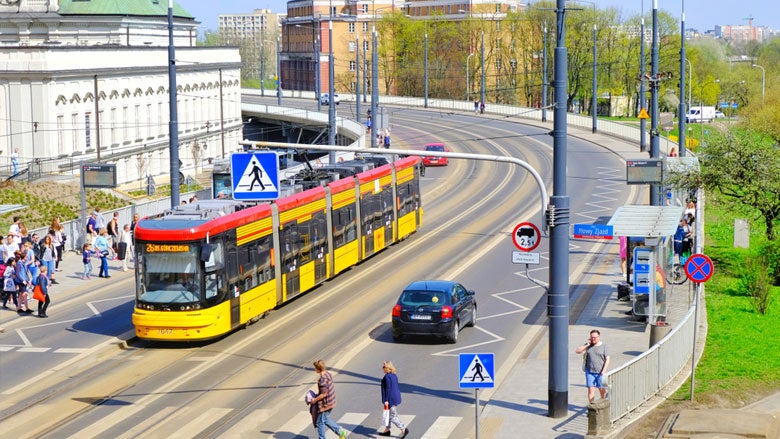
When searching for an example of how a country can improve revenues through improved taxation, look no further than Poland. By increasing tax compliance and closing loopholes in the tax system, Poland has been able to increase taxes without increasing tax levels.
Improvements in taxation subsequently created fiscal space to expand safety nets, focusing on human capital development, climate change resiliency, and other solutions to the core challenges of the 21 st century. For many developing countries looking to boost revenues in order to increase human development through improved education, healthcare, and other basic services improved taxation may be an avenue worth pursuing.
Crackdown on VAT fraud in Poland
You have probably heard that Poland is Europe’s growth champion – a country that was able to navigate the global financial crisis without experiencing a recession. But a story you might not be as familiar with is the role Value-Added Tax (VAT) played in Poland’s prudent public financial strategy.
In Poland, the importance of VAT - a consumption tax on most goods and services levied on a product’s “value added” at each stage of production and distribution - cannot be overstated. VAT represents the country’s biggest source of revenue, accounting for around 40% of the country’s budget
Given this importance, improvements in VAT enforcement and collection is vital. According to the European Commission, countries in the European Union (EU) lost almost €150 billion in VAT revenue in 2016 - almost 1% of the entire EU economy! Following the onset of the financial crisis, Poland began seeing a widening of the “VAT gap” – the overall difference between expected VAT revenue and the amount collected – prompting the country to implement a multi-year, multi-faceted plan to cement the VAT system.
After identifying areas prone to fraud, Poland launched numerous legislative efforts to address them. One of the most effective ‘targeted’ solution was the introduction of a split payment mechanism, where a buyer pays VAT directly to a supplier’s dedicated VAT bank account. In this system, a supplier has limited access to the money in this account - ensuring that VAT-related liabilities are paid. The idea came from Italy and Romania, where the mechanism was introduced a few years earlier.
Another tool employed in the fight to improve taxation was the SAF-T (Standard Audit File-Tax) reporting system, which became a requirement in 2018. Every month, companies must send a report to the tax register via a new IT system. Furthermore, a Central Register of Invoices will be established in 2019 which will help the tax authorities collect and analyze data and then follow-up with taxpayers.
These efforts have significantly narrowed the VAT gap – from nearly 24% in 2015 to around 7-12% of potential revenue in 2018 (depending on the source of the estimate). This means that, according to the latest data, Poland currently has a lower VAT gap than the EU average of 12.3%.
These higher VAT revenues are the direct result of both improvements in the country’s economic climate and the introduction of better regulations.
Tax revenues, tax morality, and the shadow economy
Two other critical components in this effort to improve taxation has been a decrease in economic activity in the ‘shadow economy’ and an improvement in ‘tax morality’ (i.e. the willingness of taxpayers to pay taxes and social contributions). According to estimates from the Polish Economic Institute, the shadow economy decreased from 15.7% of GDP in 2015 to 13.7% in 2018. Total tax revenues in Poland also increased from 32.4% GDP in 2015 to 33.9% GDP in 2017. Importantly, these additional revenues did not come from increases in tax levels, which remained constant during this period.
This increased collection improves the quality of goods and services financed from taxes. For example, the additional revenue from taxes in 2017 (1.5% of GDP) enabled the government to extend its family policy.
Towards efficient safety nets
Increased revenues have also gone toward increasing and improving social safety nets in Poland. While these safety nets are most commonly focused on cash transfers, public works, and school nutrition, the infusion of additional revenues from taxes has helped the system evolve. Recent shifts have included an increased use of cash, the introduction of programs designed to respond to climate change, more focus on productive capacity and resilience, and the promotion of human capital development. Budgetary space, created through initiatives such as improved taxation and more integration into the formal economy, are needed to put new programs into place, the government needs budgetary space.
Lessons from Poland’s experience in these areas offer some insight.
First, fundamental reforms to tax administrations are key – allowing for increases in the number of employees and overall budgets, reforms to the employment system and incentive programs for employees (promotions and rewards), and a strengthening of systemic risk assessment.
Second, data should be leveraged to both increase the competitiveness of companies and monitor those companies that are most likely to break the law.
Third, making the push to decrease the shadow economy and fight fraud a political matter is paramount. Nothing works better than social pressure – encouraging society to insist on transparency and accountability.
Finally, initiatives to strengthen the Tax Administration’s autonomy must be made in tandem with the development of mechanisms to control the legality of its work, in order to combat corruption.
------
Piotr Arak is the Head of the Polish Economic Institute, a governmental think tank in Warsaw.


Join the Conversation